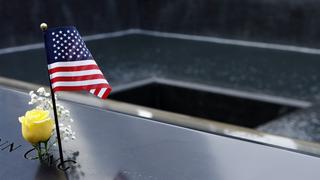20 Years Later: Ensuring We Never Forget 9/11
This year marks the 20th anniversary of the September 11th terrorist attacks — a day many Americans vowed to never forget. SJU news spoke with Jeffrey Hyson, Ph.D., assistant professor of history, about what it means to both commemorate this day and understand its significance in our history, as well as how collective memories shape our understanding of the past, for better or worse.
 A single yellow rose placed on the memorial pool at ground zero in lower Manhattan.
A single yellow rose placed on the memorial pool at ground zero in lower Manhattan.
“I was in a meeting in Regis Hall when a colleague came running in and alerted us that a second plane hit the towers,” remembers Joseph DiAngelo, Ph.D. ’70, dean of the Haub School of Business. It was early in the morning on September 11, 2001, just 17 minutes after reports broke that American Airlines Flight 11 struck the North Tower of the World Trade Center.
As DiAngelo ran back to his office, he crossed paths with one of his students in tears; her father — a childhood friend of his — worked in the towers. “He saw a plane hit the building just prior to entering and ran for cover in a hotel across the street,” he says. “Had he not been late for work that day, he would’ve been there.”
There are countless recollections like this cached in American minds. Memories of uncertainty, fear, not knowing what would come next or if loved ones were alive. But as we approach the 20th anniversary of 9/11 through the lens of a college campus — a campus filled with students for whom the attacks are not a firsthand memory but rather a day in history — how can we ensure that they and other future generations never forget?
Jeffrey Hyson, Ph.D., assistant professor of history, discusses the difference between commemoration and history and why it’s often difficult to grapple with both. He also explores the concept of “the history of our lifetime” and how collective memories shape our understanding of the past, for better or worse.
This year marks the 20th anniversary of the deadliest terrorist attack in U.S. history. As we look back on this day on a college campus, we are reminded that a large majority of Gen Z was not alive in 2001. How can those individuals commemorate this anniversary and honor those we lost?
There are many different ways that American society has already established rituals and places of remembrance associated with 9/11, whether that's far away from the sites of the attacks on the day itself, pausing for moments of silence or the ringing of church bells, or at the particular locations, its actual memorials, whether at the Pentagon, or in Shanksville, Pennsylvania, or at ground zero in Lower Manhattan.
But it's important to grapple with and understand the difference between, on the one hand, honoring and commemorating the victims of the attacks and, on the other hand, understanding the historical significance and impact of the events. This is, to some extent, the difference between memory and history.
The site at ground zero itself is actually really torn over this. There was a great piece in The New York Times about how, on the one hand, there are those people who support and help to run the 9/11 Memorial and Museum, who favor the memorial side and so they want it to be about remembering the victims and a place of respect.
There are others who say, but if it's a museum, museums shouldn't just be temples; they should also be forums, they should be places for us to discuss the consequences of those attacks or, for that matter, the reasons why the attacks occurred.
It's important to grapple with and understand the difference between, on the one hand, honoring and commemorating the victims of the attacks and, on the other hand, understanding the historical significance and impact of the events.
Jeffrey Hyson, Ph.D.
Assistant Professor of HistoryAnd that's a more complicated story. Whereas the commemoration can often be very patriotic or even nationalistic, the more critical understanding can be — as the name suggests — more critical, and maybe not cast us in such a good light.
I think, especially for people who don’t remember it in the first place, there is a lot of uncertainty about which way you should think about 9/11.
And so, for those individuals or current students who didn’t live through the attacks, are they able to understand both sides? That is, to honor and commemorate those we’ve lost and comprehend the historical impact?
Some of it depends on their own particular family connections. There certainly are families for whom if they have a personal connection with 9/11, they commemorate it in a different way than people for whom it's simply something special that their local township or school might do on that date.
More generally, most students aren’t quite ready to make the transition into thinking of the history of their lifetime as “history.” That's part of what we [as educators] try to help students see. Not only the ways in which today's history is connected to decades’ or centuries’ worth of history that came before, but that even a lot of history has been made and, in turn, is being commemorated and argued about over the last 20 years.
There are a lot of ways you can historicize [a student’s] lived experience, but that’s a challenging perspective for an 18 to 21 year old to really grasp without being pushed to do so.
What then is the history of our students’ lifetime? If September 11th defined millennials, and the assassination of JFK baby boomers, what formative event(s) will define Gen Z?
I think the death of Bin Laden in 2011 was certainly a moment where people remember where they were when they heard the news and may have gone and joined with other people to acknowledge that moment.
Getting into the twenty-teens, I do think — and I'm not saying this is a tragedy on the scale of 9/11 — but I think for a lot of people, the election of President Trump in November of 2016 [was a defining moment] in terms of just how surprising it was compared to what people's expectations were, and how much it affected people who were very concerned about what his policies were going to be.
The January 6 insurrection at the Capitol is another one. My experience — hearing reports and not quite understanding and or even believing what had happened and then watching it unfold on TV — was eerily similar to the morning of 9/11.
Some of these individual events in the last five years could have a longstanding resonance for students, but in terms of what's going to define their generation going forward, it’s probably two longer-term developments. First, there’s the impact of the financial crisis, which they probably don't remember, but which affected many of their families in really profound ways.
And then it’s the long tail of COVID-19, epidemiologically, economically, politically. The memories of that are going to feel different and, similar to the financial crisis, its impact on daily lives took a while to really sink in.
Looking back on a post-9/11 world, what has changed the most in the United States over the last 20 years, for better or for worse?
I think you can put it into two or three major categories. First and foremost is foreign policy. This is outside of my immediate area of expertise, but I think it's most immediately clear with the War in Afghanistan and the War in Iraq (which is not technically connected to 9/11 but in some policymakers’ minds and public’s minds they were sort of connected). The idea of a global war on terror has fundamentally changed the way the U.S. and many other nations approach their relationships with the rest of the world.
The second impact would be the power of the federal government, with specific laws like the Patriot Act or the Authorization for the Use of Military Force, as well as the creation of Homeland Security, both as a federal department and in some cases state-level departments.
My kids, who are college-aged themselves, don’t remember what it’s like to get onto an airplane without having to take off their shoes and go through an elaborate security system.
Jeffrey Hyson, Ph.D.
Assistant Professor of HistoryEven the construction of buildings is different today; they’re hard wiring and baking in enhanced security features. The new Freedom Tower at ground zero, for example, is a fortress. It’s totally understandable why, but it changes the way that building relates to the streetscape around it. The way we’ve come to expect that major public buildings will have Jersey barriers and bollards constructed around them — in large part because of 9/11 — has been absorbed into our society, for better or worse.
In 2002, you taught a course called History and Memory. Can you talk about the concept of collective memory and its effects on communities and generations?
Collective memory is a concept that sociologists, psychologists and historians all use in various ways. It's both recollections and representations of the past, and I think those two elements are different. It includes individual memories of events — for example, where were you when you heard about 9/11 — but then it also includes eyewitness or media accounts of the moment that help enshrine those memories collectively.
In many cases when we talk about your association with 9/11, except for the people who were living by or working close to those sites, it’s really where you were when you saw it on TV or were calling or talking to somebody. The media representations and live broadcasts become a part of the collective memory.
But then you have subsequent analysis and interpretation and contestation over what it all really means. And you have imaginative reworkings of those events — movies, TV shows — that may begin to work their way into the collective memory alongside the actual historical record.
And finally, you’ve also got those places where more of a sense of memorialization happens. And again, the purpose of memorialization is different than the purpose of remembering and understanding from an academic or critical point of view.
All that is to say, it's this very complex evolving thing; there is no one collective memory of 9/11. It is, by its nature, contested. There may be common elements to it, but it is a combination of individual memory, media reports, imaginative treatments, and political and social struggle over how to use — and sometimes abuse — the past for present purposes.
It's this very complex evolving thing; there is no one collective memory of 9/11. It is, by its nature, contested.
Jeffrey Hyson, Ph.D.
Assistant Professor of HistoryIn your new course that will be offered in the spring, Public History, you’ll be looking at the ways in which Americans consume history outside of the classroom. Can you talk more about that?
When I taught History and Memory in 2002, we actually went up to New York. Being at the physical site at ground zero, but also going to museums that had begun collecting and organizing and presenting and thinking more critically about the event, was really fascinating.
And, so for the Public History course, while I want us to be working in the classroom and online to understand how history is presented outside of an academic setting, I also want to take advantage of all the great public history sites in Philadelphia, whether that's sites affiliated with Independence National Historic Park, or whether it's some of the great archives and collections that we have.
I’m really hoping the course can get students thinking about how important it is to think about history beyond the classroom, but also how complicated and often contested and even distorted that history can be.
Learn more about Saint Joseph’s Department of History.



